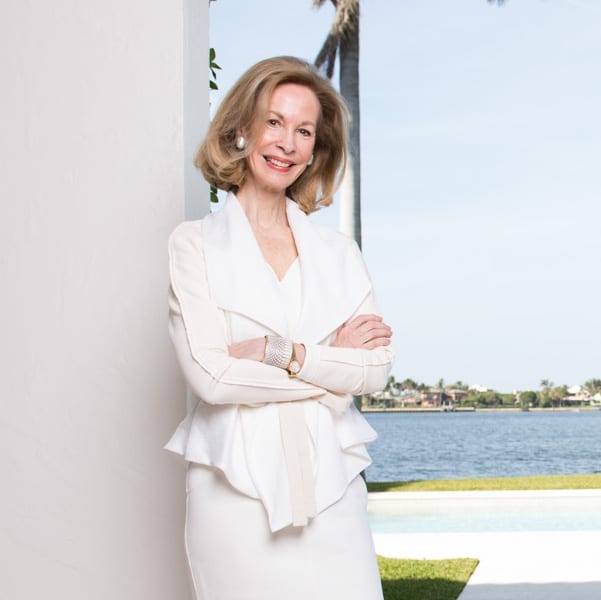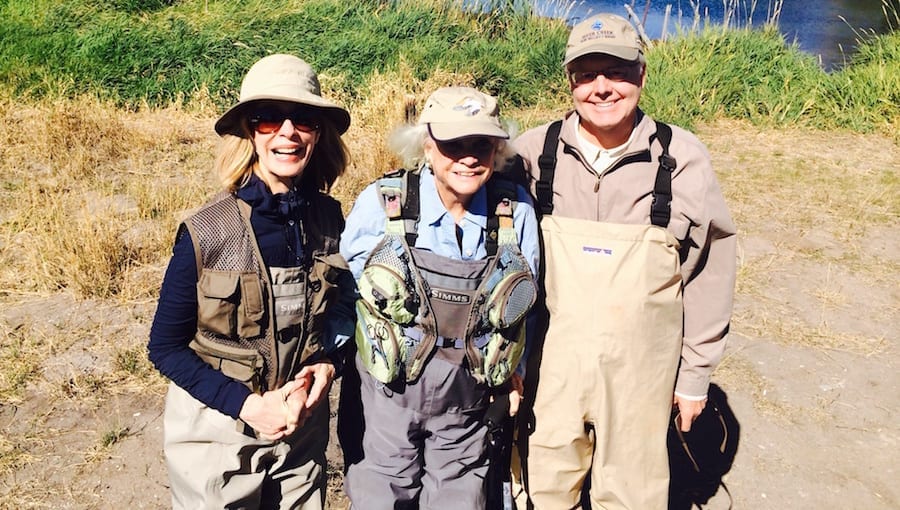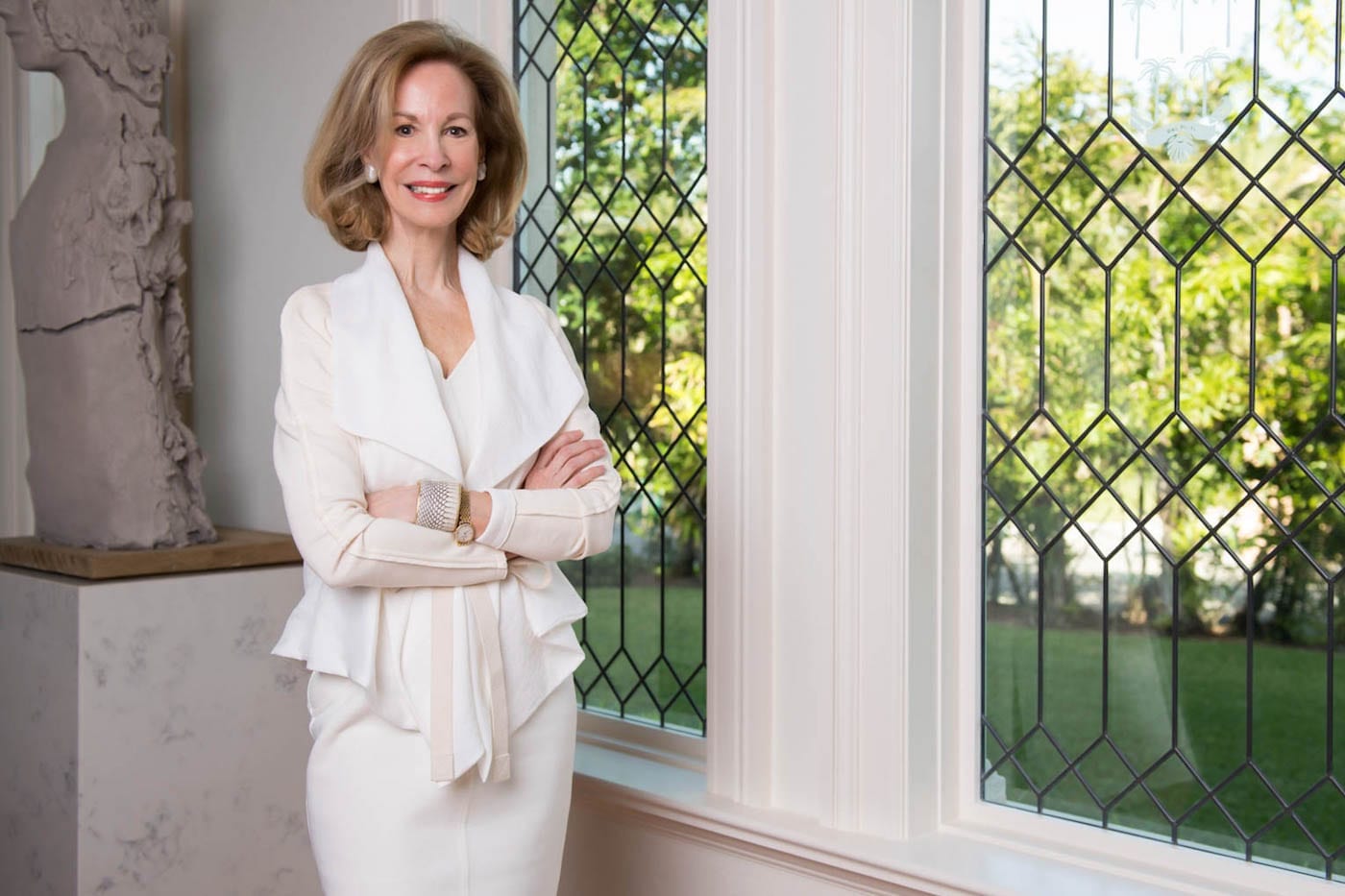Businesswoman, Philanthropist & Diplomat
Mary Bonneau “Bonnie” McElveen-Hunter is an American businesswoman, philanthropist, and diplomat who is the first female chair of the board of governors of the American Red Cross. She is the founder and CEO of Pace Communications, a publishing company, and was the U.S. ambassador to Finland from 2001 to 2003. She also served as the finance chairwoman of Elizabeth Dole’s campaign for the Republican nomination for U.S. president.
Your childhood was transient with a father in the military. What life lessons did you learn through those experiences?
I am the eldest child. I have a brother who’s a world-renowned neurotologist and is in Raleigh. He used to be with Duke and Stanford but now is in private practice. And then I have my fabulous sister who’s an interior designer and lives in South Carolina on Pawleys Island. I am so very grateful that, on many occasions, I can talk her into joining me wherever I am on the planet. I was born in Columbia, South Carolina. My father was an electrical engineer. He loved, passionately loved, to fly and was a member of the National Guard.
When the National Guard was activated during the Korean Crisis, my brother, who was just a few months old, my mother, and I moved to Germany where my father was inducted into active military service as an Air Force pilot. We lived in eight states and in Germany growing up. I had the wonderful privilege of really getting to know the fabric of America, not from just driving through, but actually living in communities from Del Rio, Texas; to Moses Lake, Washington; to Lampo, California; to Altus, Oklahoma. I think it really enriched my life. Friendships are so important because whatever we treasure oftentimes, it is the scarcest. When something is rare, it makes it even more important to us. I think the scarcity of time taught us to make relationships and to develop friendships quickly. We learned to cherish those friendships so that we could keep them alive. If you move every two months or two years, then you know that you just do not have the luxury of long-term relationships.


Bonnie holding a baby who was just immunized on a Red Cross mission trip to Ethiopia in 2006.
“I think all of us, deep inside,
have a need for dignity of
purpose. I actually witnessed
that dignity of purpose from
own parents. A great gift.”
![]()
You have a reputation for your hard work and intense work ethic. Did that originate from your parents?
I believe that you learn so much by example. Growing up, I had two parents who both were very involved. My mother and father worked. My mother taught school. She worked full-time, although she did have “the summers off.” She always spent the summers doing something else, including encyclopedia sales. During the summer, I went door-to-door with her meeting students as she talked about encyclopedias. I was privileged to grow up with that as an example. My father was up every morning and out the door before 6:30. There are habits that you have that come from the examples you experience. Hard work never seemed odd to me. It seemed quite expected that everybody would do something that would be productive. I think all of us, deep inside, have a need for a dignity of purpose. I actually witnessed that dignity of purpose from my own parents. A great gift.
You served as the United States ambassador to Finland. How did that come about?
I was Elizabeth Dole’s national finance chairman when she ran for president. I remember reading The Wall Street Journal and seeing the back page, the editorial page of Section A. I was thinking, “Here is a woman who has held two cabinet posts, but she cannot raise money to even be a voice or to have a seat at the table.” Becoming president is partially determined by how much money you are able to raise. Politics is a very expensive venture. I remember there were, of course, George Bush and Al Gore, but there was this person named Gary Bower on the Republican ticket. I thought, “I have never even heard of Gary Bower.” Here is a woman who has already distinguished herself but cannot raise money. I bet that women are not being asked to give. I called someone, and they said, “We’d love for you to help her.” The first thing they asked me was, “Can you raise money?” I had never raised money for something that was not tax deductible. I had raised $1 million a few weeks earlier for Habitat For Humanity at an event in my home. I was on Habitat’s board. I started the United Way Women’s Leadership Giving, which is now over a billion and a half dollars. I thought she was worthy of having a seat at the table. That is how I got involved in the whole process of politics and campaign fundraising. We raised more money from women donors than any other campaign in the history of politics. It was because I was a woman asking other women. Until then, nobody had specifically asked women to give. They had asked couples to give, but it was very much about working lists of traditional donors. I just broke through the normal call list and asked people that I felt would want to be a part of the process. George W. Bush later asked me if I would participate in his campaign. It took me a little while to agree because I felt so aligned and supportive of Elizabeth. When she pulled out of the race, I didn’t know that I really wanted to support anyone else. But I thought, now that I brought all these fabulous women to the table, I simply couldn’t stop. I needed to continue the process. So I joined George W. Bush and his campaign’s executive team. I was very involved in the campaign for about six months and was successful in bringing a number of new people into the political process.
In January, after it was official that George Bush was actually president, Ken Lay, Hank Greenberg, Jack Welch, and a number of other people had been invited to The White House to discuss his new tax policy. As I was leaving, the president took my hand and looked right into my face and said, “Bonnie, will you serve your country as an ambassador?” I did what every woman under pressure would do; I changed the subject. I said, “If I can do heavy lifting and make a difference. And, by the way, I want to talk to you about how your tax policy is going to affect small-to medium-size businesses because I think S Corps and LLCs are going to be impacted by these decisions.” So, I just changed the subject.
Tell me about your experience in the pageantry world and becoming Miss Nebraska.
You’re not supposed to know that. Well, growing up in a family that was Southern, pageants were part of a passage to great scholarships to colleges and universities. I think my mother encouraged us. I had studied ballet, so it was an opportunity to highlight that sort of attribute. I ended up becoming Miss Nebraska, and I will tell you that my sister did design my costume. You have to use a little imagination, but I was actually an ear of corn for the March of States. I came in this incredible costume, gold lame underneath, and this sort of mossy pale green that I guess was the color of the stalk. It made quite a show.
Did you enjoy competing in Miss America?
I enjoyed it because it taught me to overcome a lot of things, including the fear of doing something new, of being before an audience. I honestly think we grow from every experience we have, even those we sometimes look back on and wish had never happened. I felt like that experience was an experience for me to grow. I did not win, but I learned a lot, and I enjoyed meeting many of the young women that were also participating. Everybody had a different story as to why they were there.
Who was your mentor?
I grew up with my mentor. I mean, can you imagine a greater gift than being born to an incredibly Godly woman, my mother? Yet, she was not easy. She had very high expectations. We used to say, she had a very low tolerance for failure. She did not believe in the word try. She said, “You have two choices: You are either going to do something, or you’re not.” She had her “pearls of wisdom,” which I will share with you.
1. Time is precious. Use it wisely.
2. Mediocrity is the greatest sin.
3. Failure is a comma, never a period.
4. Can’t is a word that does not exist.
When I was young, we were living in Bossier City, Louisiana. My sister, brother, and I were instructed to write the word can’t on a piece of paper and put it in a shoebox. Then we took a little shovel out, dug a hole, and put the shoebox in it. We buried the word can’t. So, when someone says to me you can’t do something, or this is something that can’t be done, I always think of what we buried in Bossier City. 5. Work is a privilege.
You have a reputation for your hard work and intense work ethic. Did that originate from your parents?
I believe that you learn so much by example. Growing up, I had two parents who both were very involved. My mother and father worked. My mother taught school. She worked full-time, although she did have “the summers off.” She always spent the summers doing something else, including encyclopedia sales. During the summer, I went door-to-door with her meeting students as she talked about encyclopedias. I was privileged to grow up with that as an example. My father was up every morning and out the door before 6:30. There are habits that you have that come from the examples you experience. Hard work never seemed odd to me. It seemed quite expected that everybody would do something that would be productive. I think all of us, deep inside, have a need for a dignity of purpose. I actually witnessed that dignity of purpose from my own parents. A great gift.
You served as the United States ambassador to Finland. How did that come about?
I was Elizabeth Dole’s national finance chairman when she ran for president. I remember reading The Wall Street Journal and seeing the back page, the editorial page of Section A. I was thinking, “Here is a woman who has held two cabinet posts, but she cannot raise money to even be a voice or to have a seat at the table.” Becoming president is partially determined by how much money you are able to raise. Politics is a very expensive venture. I remember there were, of course, George Bush and Al Gore, but there was this person named Gary Bower on the Republican ticket. I thought, “I have never even heard of Gary Bower.” Here is a woman who has already distinguished herself but cannot raise money. I bet that women are not being asked to give. I called someone, and they said, “We’d love for you to help her.” The first thing they asked me was, “Can you raise money?”
I had never raised money for something that was not tax deductible. I had raised $1 million a few weeks earlier for Habitat For Humanity at an event in my home. I was on Habitat’s board. I started the United Way Women’s Leadership Giving, which is now over a billion and a half dollars. I thought she was worthy of having a seat at the table. That is how I got involved in the whole process of politics and campaign fundraising. We raised more money from women donors than any other campaign in the history of politics. It was because I was a woman asking other women. Until then, nobody had specifically asked women to give. They had asked couples to give, but it was very much about working lists of traditional donors. I just broke through the normal call list and asked people that I felt would want to be a part of the process.
George W. Bush later asked me if I would participate in his campaign. It took me a little while to agree because I felt so aligned and supportive of Elizabeth. When she pulled out of the race, I didn’t know that I really wanted to support anyone else. But I thought, now that I brought all these fabulous women to the table, I simply couldn’t stop. I needed to continue the process. So I joined George W. Bush and his campaign’s executive team. I was very involved in the campaign for about six months and was successful in bringing a number of new people into the political process. In January, after it was official that George Bush was actually president, Ken Lay, Hank Greenberg, Jack Welch, and a number of other people had been invited to The White House to discuss his new tax policy. As I was leaving, the president took my hand and looked right into my face and said, “Bonnie, will you serve your country as an ambassador?” I did what every woman under pressure would do; I changed the subject. I said, “If I can do heavy lifting and make a difference. And, by the way, I want to talk to you about how your tax policy is going to affect small-to medium-size businesses because I think S Corps and LLCs are going to be impacted by these decisions.” So, I just changed the subject.

Bonnie fly-fishing with Justice Sandra Day O’Connor and Steve Carr in 2014.
You are the founder, owner, and CEO of Pace, a Fortune 500 Company?
Yes. I started the business as part of a printing company. Piedmont Airlines was my first client. You could not have had a more spectacular client. In this litigious world that we live in, I had a handshake for 20 years. I never had a contract with Piedmont Airlines. Tom Davis, who was the founder, gave the thumbs-ups when I came over to talk to them about the magazine. Bill McGee and Bill Howard and the people there were wonderful. It was a unique time in the airline industry. It was sort of Camelot. Today’s environment is very different. When I started the company, I did everything. I was the editor. I was the salesperson. I was the whatever. I was a staff of one, and I had a part-time assistant that I shared with the owner of the printing company. I learned to just do it. As we grew and became successful, sure, I made a lot of mistakes, but I never thought I couldn’t do it. First, we started with Piedmont’s magazine. Then, we did the IGA Grocery Gram, followed by a publication for the National Builders Association. We started building and all of a sudden, we had a number of association magazines. Eventually, we had United, Delta, and U.S. Air. We ended up being the dominant player in the custom publishing business.
Where is Pace today, and how did it get there?
Today, we are still the largest custom publisher/content provider that’s privately held. But, I think my role was always in finding the best people and setting the example. If I expected other people to work hard and not accept mediocrity, then I had to as well. I never really thought about it other than I wanted to hire people smarter than I am. It was important that others really have a passion for this work. I wanted to give them all the resources and then get out of their way. I think the biggest obstacle for creative, talented, and passionate people is someone that wants to hover over them or micromanage. I always felt that the people should have a sense of independence. One of our great editors, Jay Heinrichs, who was the editor of Outside Magazine at one point, made an interesting observation. We had just finished a pitch to our client, Holiday Inn Express, and we were leaving the presentation. The art director, who has always had a wonderful wit and edge, said to Jay as we were in a bus van going to the airport, “What do you think of your boss?” I was thinking, “Well, who is his boss?” Jay Heinrichs said, “Interestingly, I never feel like Bonnie is my boss. She always makes me feel like the boss, and I work a lot harder for myself than I would for anyone else.”
What is the organizational structure of Pace with your leadership team, CEO, and a president?
The president is in charge of the day-to-day operation of the organization. I also have a wonderful CFO/COO, a woman, Lee Ann Klee, and she is also part of that management team. So, I really look to them. She runs the administrative end and is very much involved in the operational, the IT, all of those things. He is really focused on marketing, sales, and on the branding. They are very, very complementary. I really look at us as a trifecta. I feel privileged to live in this incredible world where I have access to people. I bring access, and they bring the actual execution. Although I’m not sure they always want me in every presentation, I still love the presentations because I do think that people make decisions on soft reasons. It’s not always the technology. Decisions are sometimes made because you ask yourself, “Is this someone that I can really trust? Is this someone that I think will be loyal? Is this someone that will make me look good?”
How important is loyalty?
It’s extremely important. I don’t think you can buy it. You can only earn it. And I think peoples’ view of the number of years they will work for a company is different today. I mean sometimes people are going to see what they can get and learn so that they can go somewhere else. Most of the people in our company—we have some who’ve been there 20 years, so it does skew it, but I would say that the average tenure is ten years. So, we actually are pretty darn good at keeping people.
Red Cross, the American Red Cross.
Oh, what a wonderful privilege. When I came back from being a U.S. Ambassador, they did discuss government positions with me. I loved my experience as ambassador. I actually was knighted by Finland, and I’m quite honored by that. Particularly by the president, Tarja Halonen, whom I greatly admire. When I came back, someone said, “Would you consider going to another country?” I said, “Never. My heart is full with Finland. I’ve found that government has a lot to do largely with process. I’m an entrepreneur. I have to be about results. I feel like I’m already too far along in my life to continue to push a boulder uphill. I feel like I can be much more effective in other arenas.” When I came back, they said, “All right. You won’t do this. You won’t do that. And you won’t be in ‘government.’ But would you consider being the chairman of the board of the Red Cross?” And I thought, “You know, that’s God’s work. I don’t have to give up my business. I can go back into my company. I have such talented people that I feel like this would be an opportunity to do something significant.”
“I think the biggest obstacle for creative, talented, and passionate people is someone that wants to hover over them or micromanage. I always felt that the people should have a sense of independence.”
![]()
And you were the first woman?
I was the first woman chairman of the Red Cross. The previous Chairman, Norm Augustine, had been the former chairman of Lockheed Martin, and then another gentleman, who had been the president of Aspen Institute and also Dartmouth. The Red Cross had had very prominent and very important chairmen. I am privileged to be there the longest. I think this is my twelfth year. I have technically served under three presidents.
Will you be kind enough to just share your words of wisdom directed only for me?
I think that anything is possible. People limit their possibilities by their own self-inflicted limitations. Anything can happen with hard work and God’s help. I do believe that there is a crown of favor upon your head, Karen.

